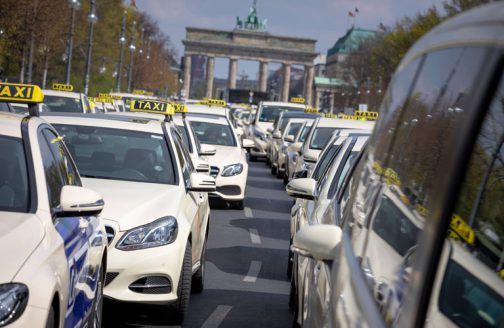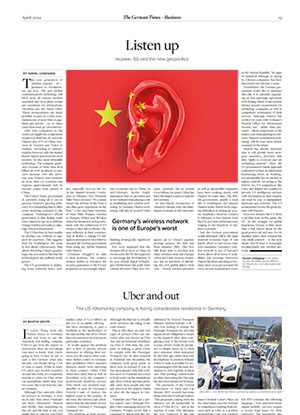The US ridesharing company Uber is facing considerable resistance in Germany

If you’re flying from the United States to Germany and you want to use the American ride-hailing company Uber to get from the airport to downtown, there are two things you need to know: first, you’re going to have to land in one of only a few German cities and, second, you should bring a lot of time to spare. While in many US cities and several countries around the world, it’s completely normal to order an Uber driver via smartphone rather than wait for a taxi, this is far from the case in Germany.
Although Uber currently offers its services in Germany, it does so in only four cities: Frankfurt am Main, Duesseldorf, Munich and Berlin. And, depending on the city and the time of day, you might have to wait for your Uber driver for as long as it takes to get your luggage at the airport – 45 minutes or longer. Plus, your Uber driver is not going to be a private person in their own car – as is usually the case in other cities; instead, you’ll probably get a professional chauffeur, sometimes even a regular taxi driver.
Simply put, Germany is not an Uber country. By now, the country’s Uber-resistant reputation has become almost a badge of pride. The company – which investors say has a potential stock market value of €120 billion on the eve of its public offering – has been attempting to gain a foothold in the motherland of the automobile, but all its efforts have encountered one reaction in particular: resistance.
It would appear the problem isn’t a lack of private drivers interested in offering their services, as is the case in other countries. Rather, courts in Germany have prohibited Uber’s standard business model from operating in their country. Other Uber offers have failed here as well: in December 2018, the company’s professional chauffeur service, Uber Black, was declared inadmissible ex post by Germany’s Federal Court of Justice, the highest court in the country. At the time, the federal court determined that the limousine service violated Germany’s Passenger Transport Act.
The problem, at least according to the court, is that professional chauffeurs in Germany are only allowed to accept orders that have been received via a centralized dispatch office or by telephone. The Federal Court of Justice ruled that Uber does not fulfill this requirement, as drivers receive their orders via smartphone app. In other words, before they accept a new order, chauffeurs would have to first drive back to the dispatch office, because they would otherwise be in violation of German law. Although this blue law is virtually never enforced, the ruling of the court stands.
This is why there are only two types of services Uber can currently offer: taxi drivers via Uber Taxi and professional chauffeurs via Uber X. This time, the company is making a great effort to comply with the Passenger Transport Act. At their relaunch in Frankfurt last December, the company took great pains to show how in-demand it was. In fact since January first, half a million users in Frankfurt have tried to book a ride via the smartphone app. Most of these attempts probably came from people who had just arrived at the airport, which is, after all, the largest in Germany.
“Frankfurt and Uber are a perfect match,” said Christoph Weigler, Uber’s managing director for Germany. Weigler noted that a constructive dialog with the city, with drivers, but also “with other mobility service providers” is crucial in the area. But these “other mobility service providers” – that is, taxi drivers in Frankfurt but also throughout Germany – are putting up quite a resistance to their competition.
In February, taxi drivers organized the first “action day” in Berlin with roughly 700 participants. The second one followed in mid-April, but was organized for all of Germany. The protests were prompted by the reform plans submitted by Federal Transport Minister Andreas Scheuer (CSU), who was seeking to change the Passenger Transport Act, and thus repeal drivers’ obligation to return to the dispatch office after completing a ride. If this reform were to pass, drivers would be permitted to simply move on to their next customer when instructed by the Uber app, rather than only by telephone. In addition, Scheuer wants to make it possible for several passengers with the same destination to ride together in these cars. This “pooling,” which works in other cities using the Uber app, has also been banned in Germany.
The president of the Federal Association of Taxis and Car Rentals (BZP) recently had some sharp criticism of Scheuer’s plans. “The proposals coming from the ministry are all unilaterally in favor of Uber & Co. – and at the expense of taxis. This threatens the very existence of the taxi industry.”
Even the ecological transport association Verkehrsclub Deutschland (VCD) considers the current Passenger Transport Act to be outdated. And yet, without mentioning the name Uber, the association still opposes any unrestricted market access, which it considers neither necessary nor helpful: “What we need is a carefully proportioned liberalization, one in which municipalities maintain planning sovereignty over ridesharing services.” Germany’s Federal Cartel Office, on the other hand, sees the increase in competition resulting from services such as Uber as a positive development. Last year, Andreas Mundt, president of Germany’s highest competition authority, said that innovative business ideas in traditional sectors should be welcomed in principle: “But we need uniform conditions for ridesharing services.”
It’s probably going to take some time before such conditions are in place in Germany, even if Transport Minister Scheuer continues to apply pressure. Indeed, even the federal government’s grand coalition agreement signed by the center-right CDU and center-left SPD contains the following language: “New platform-based digital mobility services require a secure legal basis for their approval.” The agreement also says that the Passenger Transport Act will have to be modernized.
It looks like travelers in the habit of calling an Uber when they land will still have to wait. And they’ll have to have two things in hand when traveling to Germany: patience and a plane ticket to either Berlin, Duesseldorf, Frankfurt or Munich.
Martin Gropp
is the automobile correspondent for the Frankfurter Allgemeine Zeitung.




